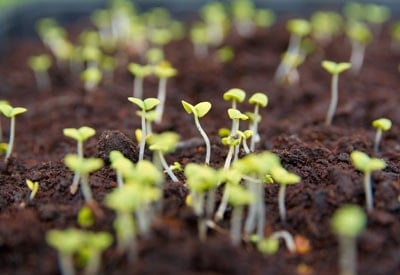 Stories that compost may be contaminated with heavy metals from wastewater and harmful herbicides leaching into the soil are not new. In 2010, the University of Maryland Extension issued a "Gardener's Alert! Beware of herbicide-contaminated compost and manure.” The Ohio State University Extension has published a fact sheet (PDF) about one persistent pesticide found in compost that kills tomatoes, eggplants and other nightshade vegetables, as well as beans and sunflowers.
Stories that compost may be contaminated with heavy metals from wastewater and harmful herbicides leaching into the soil are not new. In 2010, the University of Maryland Extension issued a "Gardener's Alert! Beware of herbicide-contaminated compost and manure.” The Ohio State University Extension has published a fact sheet (PDF) about one persistent pesticide found in compost that kills tomatoes, eggplants and other nightshade vegetables, as well as beans and sunflowers.
But lately, it seems that gardeners are starting to pay attention to another problem associated with mass-produced commercial potting soils and compost: the introduction of pests and diseases into your garden or growing space.
There are mistakes? Click on our pest solution to view images, descriptions and a full list of eco-friendly products. If it attacks plants... you'll find it here! Includes everything from aphids to whiteflies.
Potting soil, whether it comes in bags or in pots with the planting material you purchase, is a potent contaminant. It is known for introducing a once little-known root aphid into greenhouses and gardens across the country on an epidemic-like scale. It is also known to carry fungus gnats.
One popular brand of potting soil is so famous for containing insects that Work with clients There is a page dedicated to complaints.
You can also find complaints online about poor-quality soil and compost from large chain stores that contains plastic and other trash.
It is difficult to track the spread of plant diseases and fungal diseases in garden plots. But potting soil is highly suspect for the spread of disease, mold and mildew where it is used. Buy only the best quality from those you trust.
Root aphids often find their way into the soil in which potted plants are rooted. These aphids deprive plants of strength and energy, which leads to deterioration in fruiting and flowering. Buying clones and nurseries from reliable, preferably local, growers that you can ask around is a big plus. Avoid baby products sold out in chain supermarkets and big box stores.
Buying trusted brands from trusted sources is also important when purchasing manure and compost. Any compost made from city lawn clippings and other green waste may contain residual herbicides. The city of Seattle learned a hard lesson back in the 1990s when compost made from recycled yard waste began killing vegetable plants. The problem eventually led to a ban on the use of clopyralid in lawns.
Now another persistent herbicide is found in compost - aminopyralid. Aminopyralid is widely used in hayfields and pastures to kill broadleaf weeds. Like clopyralid, it attacks a variety of broad-leaved vegetable plants, including peas, beans and tomatoes. Like clopyralid, it can persist in soil and compost for months or even years (the composting process does not speed up its decomposition).
Aminopyralid, produced by Dow AgroSciences, is found in dairy and cattle manure. This manure is widely used on farms and fields, but also ends up in manures and composts sold to home gardeners.
Problems with the pesticide, first introduced in 2005, began to appear in England by 2008. Dow has suspended use of the spray until a warning is issued (link removed).
If you can't buy compost and soil from organic sources, it's safest to make your own. This way you will know exactly what is happening and what is not. Peace of mind can't always be bought.
Previous